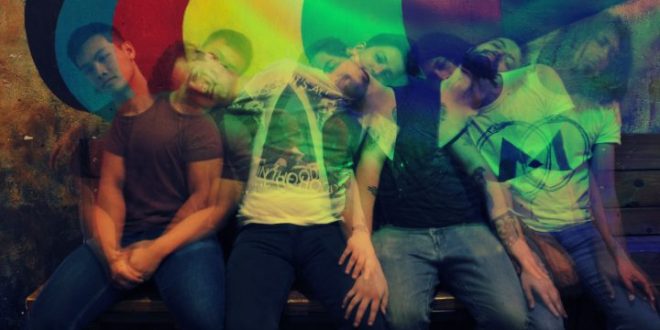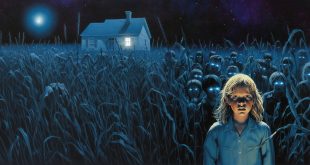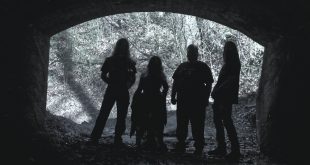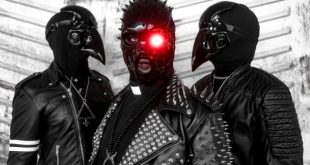Texas’s Sleeve Cannon is a step on the right path with the recent release of their debut album, KAPTV. Formed in 2017, the Austin-based quartet’s sound captures an upbeat, hearty guitar crunch with spacious textures, and an ultimate knack for introspective lyrics. To get a better understanding of the band’s journey, I caught up with front man Anton Terrell to discuss his formative influences, the album’s pertinent social media-based thematic angle, as well as what Anton has gleaned from his time with the band.
How are you guys during quarantine?
We’re doing alright. We haven’t had the chance to really jam, though, since our living situations don’t allow us to get together. At the moment, we’ve just been promoting our album, which came out last month.
Take me back a bit. When you were growing up, which bands really solidified your musicianship?
I think bands like Nirvana, Pixies, Sonic Youth, and the whole grunge era, is what started it. Then, that got me into exploring the garage punk scene, like Thee Oh Sees and Ariel Pink, and some of the weirder shoegaze stuff as well.
You formed Sleeve Cannon three years ago. What was that initial period like as you were getting together?
I’ve known Kyle Tapia, the drummer, since high school, and this was his first project drumming; he used to play guitar. Back when I lived in Santa Fe, he was in a couple of bands, so we’ve known each other forever and have always had that chemistry. Our original guitarist was someone I was in another band with, and Andre Velasco I met on Craigslist, so I kind of just got these random people together that I either knew or had met, and was just like, “Let’s see what happens.” I remember it being a good source of creativity – in one of our first sessions together, we wrote three songs – and we just stuck with it to this day. It just felt right; there was obvious chemistry going on.
What was your other band like, and how was the transition into this band?
It was really different. The other band was a folk duo I had with my good friend Bethany, and we were playing acoustic guitars and ukuleles, but we wanted to expand and get a bassist and a drummer, and the bassist for that band ended up being the original guitarist for this band. But Bethany wanted to pursue her own projects, since she felt like her original message was getting too watered down by what we were doing. So, me and the original bassist, Tre Abraham, were like, “Huh, I guess we can keep jamming, but we gotta find other people,” and it ended up being a smooth transition.
Over the years, you’ve worked at developing a distinctive live presence, but these times have essentially wiped that aspect out. Do you miss being able to play live?
Yeah man, for sure. We aren’t doing anything live until cases are way down. There’d have to be a lot of safety precautions in place before we’d even consider it – not just for the band, but in terms of gathering fans in an area that won’t pose a risk to their health. Playing live is our favorite thing in the world, but our fans’ health comes before that.
Your album KAPTV has been out for a while. How did that come about originally?
The album started as a collection of songs that were written in the first incarnation of the band, which had the bassist Tre Abraham, who I mentioned earlier. He, I, Kyle, and Andre – we had all written those songs, and then, in the summer of 2019, Tre Abraham left, and Tre Pham joined. We wanted to keep the other songs, but also make new ones, because we wanted to write with Tre and not just have him play what we’d already written. By keeping the older songs in addition to the new material, we’d have a debut recording in album format to showcase. We wanted to give the old songs a proper send-off, and then have a way to start fresh. For now, the last song on the album, “Wrecked,” is the first one we’d written with Tre Pham.
How do you like working with Tre Pham these days?
I love having him in the band! When we first met, and he initially toured with us, we didn’t know if it was going to be a primitive thing, but he learned the songs so fast. He was only 20 at the time and wasn’t allowed into the bar we were playing in, so he was playing outside and listening in wirelessly (laughs)! He was able to hit every note without even being in the room, and I was like, “Man, we would be complete idiots if we didn’t have him with us.” I was really happy that he was able to join and that it worked out. I think there’s a lot of chemistry with him that we already have in place, but he also has a lot of drive and ambition that give us the fire we need.
And intuition too, since he’s able to perform with that kind of proficiency.
Yeah, it was one of the most impressive things he’d done, and I’m glad that it was a part of what happened with our band.
I appreciate the focus in the ongoing theme for the album, about the impact of social media. When used properly, it brings us together, but once it reaches a saturation point, it inadvertently drives us apart. Could you elaborate a bit on the process for coming up with that?
So, the instrumentals would all go first, and then I’d come in and fill in the space with vocals. I was subconsciously letting whatever I wanted to come out, come out. Usually, when we’re in the studio tracking, we’d record all the scratch tracks, and then have nothing to do for the next several hours (laughs). Looking through those tracks, I was like, “What was I trying to say with this,” and the themes that kept coming back to me were connectedness, and the isolation that comes from the saturation of connectedness, like you’d said. In a sense, it can feel isolating to know that anyone can be a click away from connecting to. It’s become so easy that people no longer think of putting in that effort.
What I gathered from each song was this recurring imagery of a source of light that, depending on how we view it, is either something valuable that we gravitate toward, or something that blinds us.
Awesome! I’m glad you picked up on that, because that’s what we have going on throughout the album for sure.
For the album’s production, how did you get all the songs to sound the way they do?
Once again, Tre Pham was the hero in that. There are actually two tracks engineered by Nate King, but Tre mixed and mastered the majority of them. He has his own studio setup at home. We recorded the tracks at Space Studio here in Austin, and Tre took the stems with him and did everything with them. I think he finished them all within five months.
Other than the style and sound, another aspect that carries the 90s aesthetic is the cover art. What did you have in mind for the design?
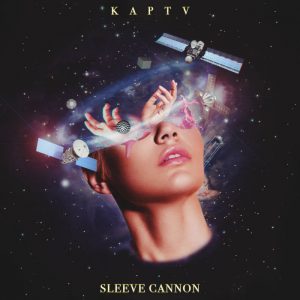
It’s kind of ironic that the album is about the negative aspects of social media, when social media actually helped us find an artist for the cover art (laughs). I wanted to find a local artist, originally, so I searched ‘#atxartists’ on Instagram to see who we’d vibe with, and we found Guillame Tronel. It turned out that even though he was using that hashtag, he’s actually based in Paris, but it didn’t matter in the end, because we wanted him to at least do the art for this album. We were discussing how to convey a communication-based theme with his style of art, so we thought of cell phone towers coming out of someone’s head, and within a month, he came up with that design.
I really like how it turned out. It has a similar retro appeal as if it was on a vinyl record.
Yeah, that’s kind of what we were going for. With modern music nowadays, so much of what people discover may be from a playlist. We figure if we’re on a playlist, and someone sees something nostalgic like that, or something where they’re like, “Woah, what’s going on with this album cover? This is weird as hell,” they’d be more drawn to our music.
In the past ten years or so, you’d see bands that sound either really saturated and processed, or really full and raw like you guys. But nowadays, especially with the impact of the pandemic, where do you see music going in 2020?
It’s hard to say. My answer probably would have been different in March, but as of right now, any prospects for live music as we used to know it are pretty much wiped out, like you said earlier. It seems like a lot of music would be more recording-based, and a lot less grounded in reality. There’s a lot more emphasis these days on the simplicity of beat making, and beat making software, which will become more exasperated in a way. Maybe there will also be a lot of lo-fi, bedroom pop coming from this era. Something that gives me hope is hearing stuff like Fiona Apple did, with her album Vegetable Cutters – that weird, almost avant-garde angle where it’s like, “Okay, there’s no goals anyway. I don’t have to necessarily replicate this on a live stage,” and use that medium to capture something that wouldn’t have otherwise been done by taking a more traditional route.
Even with the traditional opportunities being hampered, you still have to count your blessings.
That’s true, especially if you’re a band with a smaller following. In the meantime, you’d play for your friends or maybe some other bands, but recording is a whole other art form that you can delve into.
In the three years you’ve been in this band, what have you learned?
That’s a really good question. For me, I wanted to learn how to reach the goal of releasing an album, so I’ve been hell-bent on it for the last three to four years. Now that the album’s out, I’m thinking about what to do for the next release. To be completely honest, I learned that it’s important not to rush, and to let things develop organically at their own speed. When you normally put that kind of pressure on yourself, you’re tempted to take shortcuts, and I admit that we’d taken a few on this album. But for next time, by not being bound by that pressure, and recognizing that whatever’s meant to happen is meant to happen, we’ll make sure to allow ourselves that space for ideas to unfold as they’re supposed to.
Lastly, anything you’d like to say to your fans?
Thank you for checking us out, and we hope you’re enjoying the album! Be sure to reach out to us; we read all our messages and would love to hear your thoughts. Hopefully soon, we’ll be able to play live again and meet all of you.
Sleeve Cannon Socials:
 Music Existence Because of Music, We Exist
Music Existence Because of Music, We Exist
